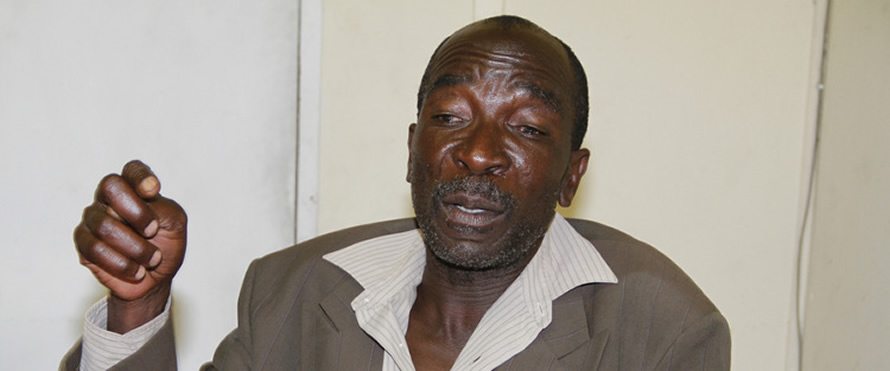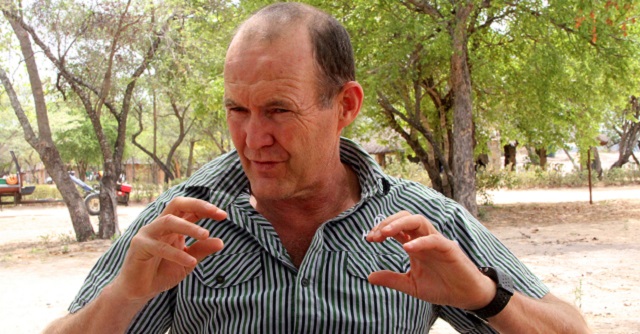
The Sunday News

IN recognition of the efforts played by our heroes in the fight against the racist Ian Smith regime we continue with our articles on freedom fighters who survived dangerous situations during the armed struggle. The articles are focused on those who were deployed to the front and operated as field commanders.In this week’s article Assistant Editor, Mkhululi Sibanda (MS) speaks to Cde Winter Johanne Ncube, whose pseudo name was Amin Dumani. Cde Ncube, a platoon commander survived a deadly situation in Lupane when his colleagues fled from an ambush they had laid for the Rhodesians leaving him facing 15 enemy forces and miraculously he gunned all of them down. Cde Ncube was one of the freedom fighters who survived the onslaught by the Rhodesian forces in March 1978 when they cordoned off the Dongamuzi and Mzola areas for about a month. Cde Ncube and his unit had just arrived at the front after completing an intensive military training by Russians and Cubans at Boma in Angola. He was part of the first group of 2 000 guerillas to be trained in Angola.
MS: Cde Ncube can you please give us your brief background
Cde Ncube: I was born in Sanzukwe area in Mangwe District on 15 November 1957. I went to Brunapeg School after which I left for South Africa to look for employment and that was in 1976. In South Africa I worked at a restaurant and at a construction company. The construction company was owned by a Portuguese man who had fled from Mozambique when it attained its independence in 1975. That man was a racist and his treatment of blacks as dogs led me to leave the job for Zambia via Botswana to join the armed struggle in February 1977.
MS: How long did you stay in Botswana and take us through the whole journey.
Cde Ncube: I only stayed in Francistown just for a day as the following day we were flown to Zambia. I am not sure why I and my group were taken so quickly to Zambia as we left some people we had found there. But I think it had to do with our behaviour as injivas, the authorities maybe felt we were going to change our minds and go back to South Africa. There were many people who had come from South Africa and a majority of us were a bit naughty. Remember we were very young. I was 19 at that time. In Zambia our first port of call was Nampundwe Transit Camp and then we were moved to Freedom Camp. That is where we boarded the trucks to Boma in Angola.
MS: How was the training in Angola?
Cde Ncube: It was very intensive and the Russian and Cuban instructors were very good. Among the instructors were three cadres from Zipra, Cdes Ben Dupu, Sotsha Mpunzi and Botsheni, a very active cadre who spoke broken SiNdebele as he was Shona. We completed the training after six months and returned to Freedom Camp where we had problems with our commanders. I specialised in anti-tank weapons.
MS: What were the problems and who were the commanders?
Cde Ncube: They included the army commander himself, Alfred Nikita Mangena. They thought we were too showy. In fact they were not happy why we asked them the reason for treating recruits better than us. One of the commanders, Cde Single then came and told us that we were being moved to CGT. We went there and stayed for a week unarmed and when Cde Cephas Cele (late) came we held him hostage demanding our weapons and the issue was then solved. We were then given our weapons and later deployed to the front.
MS: So take us through the deployment exercise.
Cde Ncube: It was around February 1978 and we were driven to the crossing point called DK where we found a veteran guerilla called Cde Tangwena who was in charge of the crossing exercise. However, before we went to the crossing point, about eight comrades were sent to check on the situation on the Zambezi River, but those guys did not return as they were ambushed. There was only one survivor from that group. We then went to check on the situation and we managed to locate their bodies, but when we were still there we were taken aback as another group of 30 comrades came under heavy attack from the Rhodesians who had air support from helicopters.
MS: Where were those comrades coming from?
Cde Ncube: We had trained together in Angola and they were on their way to Mberengwa, which was supposed to be their operational area. There were heavy casualties on both sides as our comrades fought heavily. Now the mission to cross was disturbed and we had to wait for reinforcements from the rear. They eventually came and Cde Mangena also came. He gave an address and said he believed that after such heavy fighting we now appreciated that the enemy was dangerous. We were also joined by other guerillas who were coming from the front in Lupane led by SaZiqondiso and these are the people who assisted us in crossing the Zambezi.
MS: Then after crossing the Zambezi what happened and where were you going?
Cde Ncube: It took us about three days to reach the villages that is the area on the border between Lupane and Binga. By that time we were about 100. The villagers then told us that Rhodesian forces had been asking about the presence of guerillas coming from Angola. We then proceeded to Dongamuzi where we found more guerillas who had been operating in that area for some time and these are guys who took over command and split us into units of eleven each. In fact my group was going to Kezi, but because of the situation that changed dramatically we had to delay our programme.
MS: How did the situation change?
Cde Ncube: Just a day after we arrived in Dongamuzi it was decided that we plant a landmine on the nearby road that was frequently used by the enemy. I was in the group that planted the landmine and it was around 9am. Two hours later an enemy truck arrived at the spot and it was blown by the landmine. We had provoked the enemy and a few hours later helicopters were all over the show while ground force units were everywhere and fighting began. That afternoon three of our units were involved in three separate battles. There was fierce fighting all over. It was during that time that three Rhodesian soldiers fleeing from one of our units fell into our ambush.
MS: What happened?
Cde Ncube: Those Rhodesians came straight at us and you could tell they were in a panic mode. When they were a few metres away we brought them down. The situation became worse as days passed by with three or four contacts every day. Those Rhodesian forces had cordoned off the area and they thought they would flush us out, but that was not to be as we fought tenaciously.
MS: Give us an account of some of the battles you were involved in during that critical period.
Cde Ncube: There were many, such as when under the command of SaZiqondiso, a veteran guerilla, we attacked a camp where Rhodesians had set base. We attacked the camp at sunset. In fact we had not realised that it was an enemy base as in the afternoon we had spotted a few soldiers there, who were guarding the injured. We did not attack it then because we were afraid of being harassed by helicopters. So in the evening when we went to attack we were taken aback to be met with heavy resistance, but we fought heavily and that forced the enemy to use helicopters despite the fact that it was dark. The enemy suffered heavy casualties but it was difficult to find out exactly the number of casualties. Among the 30 of us no one was injured. But when we were withdrawing we came across some of the enemy forces that were going to that base and fighting started again.
MS: So you continued fighting and what happened?
Cde Ncube: Yes we continued fighting, but later withdrew. However, because of the situation we could not locate each other and I remained with eight comrades. We then went to nearby villages to look for food and slept there. The following morning we were alerted by villagers of the presence of more enemy soldiers. Those soldiers were tracking us. We told the villagers that they should tell the enemy about our presence and the direction we had taken. We then laid an ambush some distance from the villages. The villagers did as we had told them and the enemy kept track of us.
MS: How many were you in that group?
Cde Ncube: We were still nine. While we were still in our positions, six comrades rose and fled when they saw the enemy coming. That left the three of us and the two comrades who were with me also panicked and they whispered saying we should just let the enemy pass. It was at that time that I realised that there was danger of us being captured alive as the enemy was heading straight towards us. There were 15 of them, very big white guys who were clearly well fed. But at that time I just summoned courage, looked at my RPK and told myself that I had to die with some of those Rhodesians.
MS: So what did you do?
Cde Ncube: Those 15 soldiers were in single file and because of the thick vegetation they did not spot us and they continued coming towards our positions and when they were just a few metres I squeezed the trigger and opened fire. Up to now I really don’t know what happened. I only realised what I had done when I heard the click of the bullet belt of the RPK signaling that I had used all bullets and there were 15 Rhodesian soldiers lying dead. When I looked for my two colleagues they were nowhere to be seen, they had fled as well leaving me at the mercy of the enemy. On that day I thanked my Kalanga ancestors. I later on linked with my colleagues and they were shocked to see me. I was a hero on that day. However, we continued with fighting until the enemy withdrew. That was after a month and we then left for Kezi.
MS: Take us through the way to Kezi.
Cde Ncube: We were supposed to be 30, but some of the comrades remained in Lupane while others took a different route. In my group we were eleven under the command of Cde Tenderekayi. We passed through Tsholotsho where we came across some of our comrades who were operating there, but the situation was not as tense as in Lupane.
While we were still in Tsholotsho, in Mswigana area we were alerted by the villagers about the presence of amaDAs and went to where they were and surrounded them.
Those guys were eight, they had no chance. In fact they simply surrendered, but because we did not have prisons and time to keep on guarding them, we just killed them. We then moved to Bulilima, Mangwe and then Kezi.
MS: How was the situation in Kezi?
Cde Ncube: For trigger happy people like some of us, it was frustrating because the enemy did not want to engage us. The battles were not as frequent as in Lupane. At times the enemy forces would just run away when they learnt of our presence. However, there were three heavy battles that I will never forget that we fought at Ratanyana Hills, St Joseph’s and Cross Roads. Later on we divided Kezi into three operation areas and I was put in charge of areas such as Manyane, Donkwe-Donkwe, Mkuwa, Shashane and Mankala. As time moved on at times we would carry joint operations with our colleagues from Umkhonto who were on their way to Beitbridge and South Africa. I stayed in Kezi until the ceasefire. We moved to Zezani Assembly Point and later integrated into ZNA and I was at 1:2 battalion. However, typical of my people from Kezi, Mangwe and Bulilima I left the army a few months later for South Africa to look for employment where I worked until 2007.
MS: Who were some of the comrades that you operated with?
Cde Ncube: They included my close friend, Destroyer, Parks, Magwegwe, Mahlangu and Black Search.
MS: At the moment what are you doing?
Cde Ncube: I am a beneficiary of the successful land reform programme and I have a home in Marula commercial farming area where I live with my family. I also have a house in Plumtree town.
MS: As a parting shot any message to Zimbabweans?
Cde Ncube: The country should remain united and we should protect the gains of our revolution. However, the full history of the struggle should be told and some of us who came face to face with death have all the information. We should also respect each other as all Zimbabweans who were old enough during the struggle participated in one way or the other in the defeat of the enemy.



